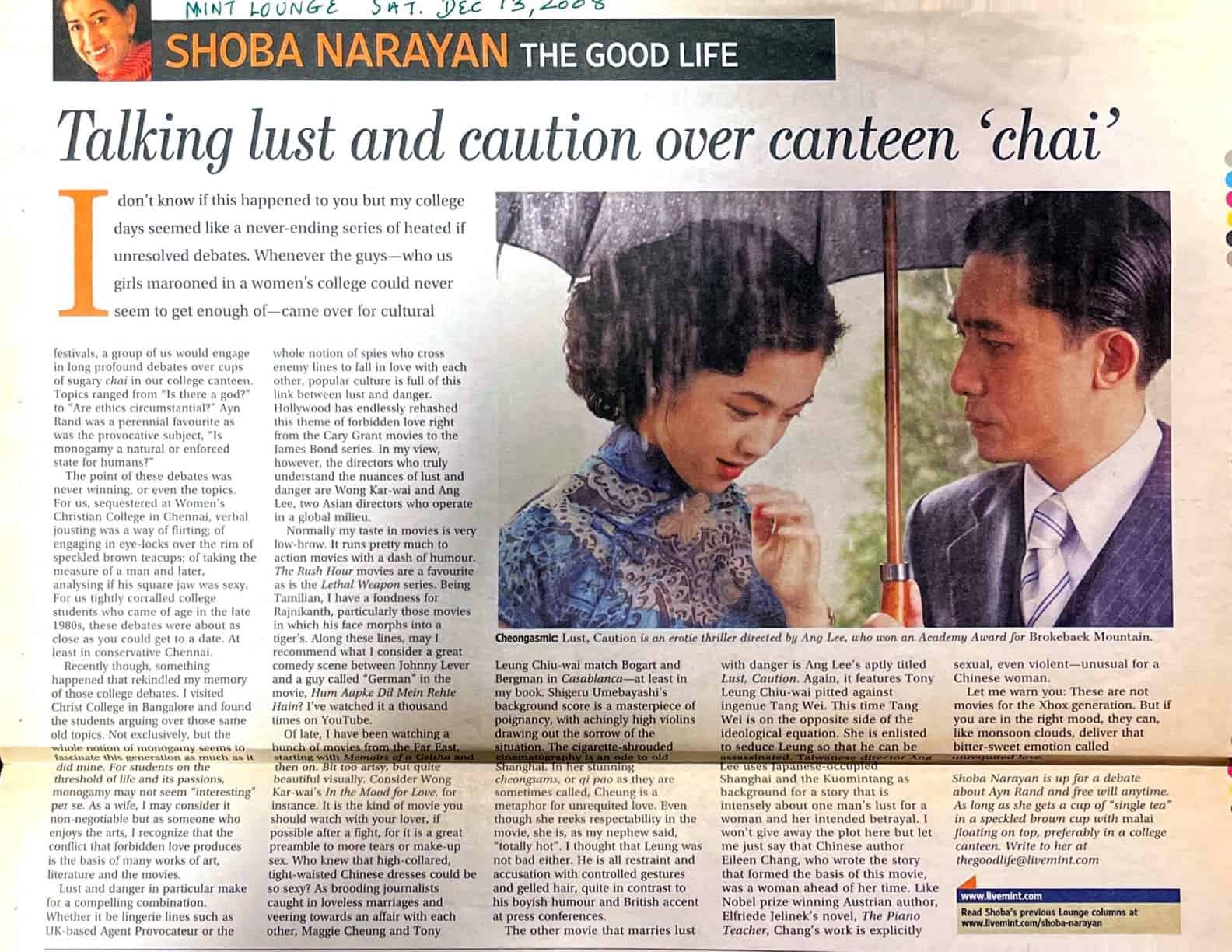I don’t know if this happened to you but my college days seemed like a never-ending series of heated if unresolved debates. Whenever the guys— that fascinating species that we girls marooned in a women’s college could never seem to get enough of– came over for cultural festivals, a group of us would engage in long profound debates over cups of sugary chai in our college canteen. Topics ranged from “Is there a God?” to “Are ethics circumstantial?” Ayn Rand was a perennial favorite as was the provocative subject, “Is monogamy a natural or enforced state for humans?”
The point of these pointless debates was never winning, or even the topics. Verbal jousting for us was a way of flirting; of engaging in eye-locks over the rim of speckled brown tea-cups; of taking a measure of a man and analyzing if his square jaw was sexy. For us tightly corralled middle-class Madras girls (or babes as my editor would say) who grew up in the seventies, these debates were about as close as you could get to a date.
Recently though, something happened that rekindled my memory of those college debates. I visited Christ College in Bangalore and found that, guess what, the students arguing about those same old topics. Not exclusively but the whole notion of monogamy seems to fascinate this generation as much as it did mine. The thing about monogamy is that it is not “interesting” per se, especially to students on the threshold of life and its passions. As a wife, I may consider it non-negotiable but as someone who enjoys the arts, I recognize that the conflict that forbidden love produces is the basis of many a work of art, literature and the movies.
Lust and danger in particular make for a compelling combination. Whether it be lingerie lines like UK-based Agent Provocateur or the whole notion of spies who cross enemy lines to fall in love with each other, popular culture is full of this link between lust and danger. Hollywood has endlessly rehashed this theme of forbidden love right from the Cary Grant movies to the James Bond series. In my view however, the directors who truly understand the nuances of lust and danger are Wong Kar-wai and Ang Lee, two Asian directors who operate in a global milieu.
Normally my taste in movies is very low-brow. It runs pretty much to action movies with a dash of humor. The Rush Hour series is a favorite as are the Lethal Weapon ones. Being Tamilian, I have a fondness for Rajnikanth, particularly those movies in which his face morphs into a tiger. Along these lines, may I recommend what I consider a classic comedy scene between Johnny Lever and a guy called “German” in the movie, ‘Hum Aapke Dil Mein Rehte Hain?” I’ve watched it a thousand times on YouTube.
Of late, I have been watching a bunch of Oriental movies. Bit too artsy but quite beautiful visually. Consider Wong Kar Wai’s ‘In the Mood for Love,’ for instance. It is the kind of movie you should watch with your lover, if possible after a fight, for it is a great preamble to more tears or make-up sex. Who knew that high-collared tight-waisted Chinese dresses could be so sexy? As brooding journalists caught in loveless marriages and veering towards an affair with each other, Maggie Cheung and Tony Leung match Bogart and Bergman in Casablanca– at least in my book. Shigeru Umebayashi’s background score is a masterpiece of poignancy with achingly high violins drawing out the sorrow of the situation. The cigarette-shrouded cinematography is an ode to old Shanghai. In her stunning cheong-sums, or qi-pao as they are sometimes called, Maggie Cheung is a metaphor for unrequited love. Even though she reeks respectability in the movie, she is as my nephew said, ‘totally hot.’ I thought that Leung was not bad either. He is all restraint and accusation with controlled gestures and gelled hair.
The other movie that marries lust with danger is Ang Lee’s aptly titled “Lust, Caution.” Again, it features Tony Leung Chiu-wai pitted against ingenue Tang Wei. This time Tang Wei is on opposite sides of the ideological equation. She is enlisted to seduce Leung so that he can be assasinated. Taiwanese director Ang Lee uses Japanese-occupied Shanghai and the Kuomintang as background for a story that is intensely about one man’s lust for a woman and her intended betrayal. I won’t give away the plot here but let me just say that Chinese author Eileen Chang who wrote the story that formed the basis of this movie was a woman ahead of her time. Like Nobel prize winning Austrian author, Elfriede Jelinek’s novel, The Piano Teacher, Chang’s work is explicitly sexual—unusual for a Chinese woman.
Let me warn you: these are not movies for the Xbox generation. But if you are in the right mood, they can, like monsoon clouds, deliver that bitter-sweet emotion called unrequited love.
Shoba Narayan is up for a debate about Ayn Rand and free will anytime. As long as she gets a cup of ‘single tea.’






Leave A Comment